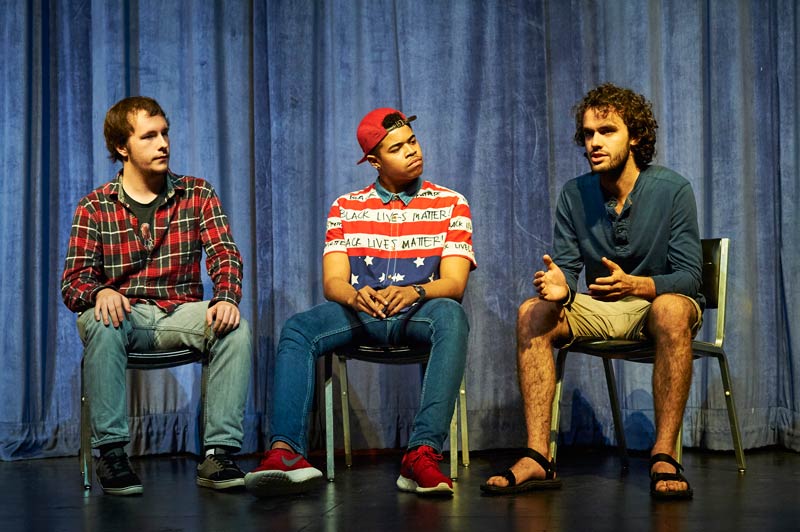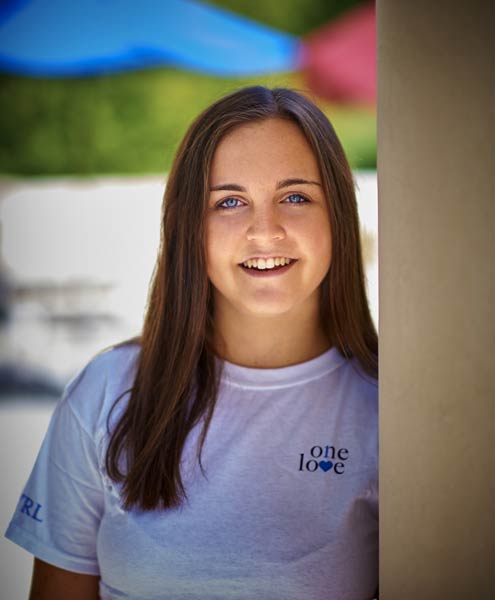Students work toward a positive sexual climate
The issue of sexual assault on college campuses has become a national conversation, and many members of the Colgate community have been working broadly to build solutions here on campus. While there is much to be done (see A message from Dean of the College Suzy Nelson), a recent survey showed that Colgate students already have a good understanding of the definition of sexual assault, and they know how to access university services in the event of an assault. Credit goes, in part, to students who have engaged in peer-to-peer education, talking to each other in ways that only classmates can. Here are three examples.
No longer just willing to stand by
It’s a common situation: a group of students are having fun at a party. But, when they notice that a friend may be overly intoxicated, their actions could dramatically change what happens next. For example, simply asking a friend or peer, “Are you OK?” can have a substantial effect on the trajectory of the evening.
Scenarios like this are presented to students in Bystander Intervention Training: a two-hour session that empowers students to look out for the well-being of their peers as well as protect their own safety. Students learn how to identify and safely intervene in dangerous and unhealthy situations.
The program was introduced in spring 2014 as part of the university’s increased efforts to prevent sexual assault and gender violence on campus. It also includes conversations about bullying, sexual harassment, and intimate relationship violence.
This year, for the first time, special trainings were held for first-year seminar classes in the beginning of September (in the past, sessions have been offered throughout the semester). This targeted approach increased the number of first-year students who participated, to a total of approximately 600 (at press time). The sessions were facilitated by 20 trained students.
“The real strength of the program is that it is student led,” emphasized khristian kemp-delisser, assistant dean and director of LGBTQ initiatives.
Colgate’s Bystander Intervention Training is based on a model from Duke University called PACT (Prevent, Act, Challenge, Teach). A team of Colgate staff and faculty members brought the program here, and it quickly garnered interest from the campus community. Those participating in the initial sessions provided feedback for tailoring the program to Colgate’s campus climate.
“The real strength of the program is that it is student led,” emphasized khristian kemp-delisser, assistant dean and director of LGBTQ initiatives.
With Bystander Intervention Training, students are taught to be more aware of their — and their friends’ — actions, explained kemp-delisser. “People make decisions and continue behaviors based on the reactions they get from others,” he said. With more people talking about what’s appropriate and what consent means, there will be increased understanding.
Each training includes a discussion of the university’s definition of sexual consent, videos showing scenarios in which students should intervene, and ways to safely navigate the situation.
“Although the background information we give on consent and rape culture is crucial to all sexual encounters, the Bystander Intervention program is unique because it works to prevent those dangerous sexual encounters from occurring in the first place,” said Rosemary Tootell ’16, a Bystander Intervention intern.
The program also underlines the fact that these incidents can affect anyone. “The goal,” Tootell said, “is to make students of any grade, gender, or status feel comfortable intervening in a situation where one of their peers could be hurt.”
— Lauren Casella ’16 and Aleta Mayne
The stage becomes a safe space
The audience was struck silent after four women took to the stage in October and delivered narratives about the challenges and uncertainties in navigating how to help a friend who survived sexual assault. When the women finished by holding hands and speaking in unison, the power of the performance was palpable among those watching. (Pictured at top; both photos by Anna Heil ’16.)
This scene was part of This Is Not a Play About Sex, a show that strives to explore important truths about humanity through an examination of sexual expression and experience on campus. The show — now in its fourth year — is written, directed, and performed by students.
Christina Liu ’13 created the play in 2012 as part of her senior capstone project. Through interviews with fellow students, Liu realized that most people were looking for two things: permission to be their authentic selves, and deeper connections with others.
“This is not a play about sex,” Liu recently told the Scene. “These are stories about vulnerability.”
“Activism takes many forms, and the cool thing about activism in art is that you plant seeds.”
— Charity Whyte ’16
The play is composed of a series of narratives based on true Colgate stories, and although the narratives remain the same, this year, the directors chose to involve more people in each scene to emphasize the importance of connection and community.

Originally performed in a small studio, the play has grown so much in popularity that it now takes place in Brehmer Theater — nearly 1,000 people saw it this past year. The strength of the show, and the positive reception that it has garnered, is just one way in which the Colgate community is acting on conversations.
“Activism takes many forms, and the cool thing about activism in art is that you plant seeds,” said Charity Whyte ’16, this year’s artistic director. “Art can speak to hearts in ways that policy can’t.”
When Providence Ryan ’16 first saw the play, she immediately felt its impact.
“I was in this place at Colgate where I felt like I didn’t understand the people around me, and they didn’t understand me either,” Ryan said. “And then I saw this one monologue in the show, and I was like, ‘That’s me.’ I thought that I was alone, but then I saw that another Colgate student had a similar life story, and that was huge for me. It made me understand who I am, and it helped me see that there are people to talk to at Colgate and that I could reach out to help other people, too.” As this year’s executive director of the play, she hopes that others have been inspired in the same way.
Liu said that the success of the play indicates that more movements like this — where art is used to express, explore, and share truths — need to happen: “It is a constant reminder that we are desperately looking for space where we can genuinely hear from one another.”
— Meredith Dowling ’17

Allison Burstein ’18 by Andrew Daddio
Learning from Love
Allison Burstein ’18 has trained more than 200 of her classmates, friends, and acquaintances on campus to identify the warning signs of domestic violence.
University of Virginia lacrosse player Yeardley Love was killed by her ex-boyfriend in May 2010, just weeks before she was to graduate. Five years later, and 500 miles to the north, Allison Burstein ’18 is working hard to make sure the same tragedy doesn’t befall her friends
and classmates.
Last summer, the Bronxville, N.Y., native went to the offices of the One Love Foundation to offer her services as an intern. The foundation was formed by Love’s parents to promote awareness and prevention of domestic violence among college-age students.
“I initially thought I could volunteer my time or be trained to be a facilitator and do a couple workshops,” she said. “But when I got there, they expressed a greater need for more hands on deck, so I ended up going pretty much full time.”
Under normal circumstances, anyone wishing to participate in One Love programming would need to corral a critical mass of campus volunteers and connect with foundation employees in Bronxville via Skype during the 9-to-5 workday. But thanks to her unexpected promotion, Burstein has turned Colgate into a rarity among the more than 250 colleges and universities that engage with the One Love Foundation. She is the Colgate campus leader, capable of presenting the organization’s 40-minute scripted film on relationship violence, conducting the follow-up session (known as the One Love Escalation workshop) with fellow undergraduates, and training others to do the same.
“We hear things a lot better when they’re coming from someone who’s on the same level,” Burstein said. “When you care passionately about an issue and you are also a Colgate student, other students will show you the respect of caring about that issue, too.”
During the criminal trial of Love’s ex-boyfriend, the Love family learned that fellow UVA students and teammates had known about the abusive nature of Yeardley’s relationship, yet no one had reported the dangerous behavior. The One Love Foundation, originally a fundraising initiative, consequently shifted its focus toward education.
As a peer educator, Burstein can play a particularly powerful part in that effort.
“We hear things a lot better when they’re coming from someone who’s on the same level,” Burstein said. “When you care passionately about an issue and you are also a Colgate student, other students will show you the respect of caring about that issue, too.”
Although the film and workshop discussion appeal to all kinds of students, they resonate particularly with athletes. Heather Young and Mike Murphy, Colgate’s women’s and men’s lacrosse coaches, respectively, decided to make the program mandatory for all their players. “We felt that it would be great to have them attend the escalation talk together,” said Young, “especially since our teams are very close friends and some date each other.”
“You can find some little bit of Yeardley’s story that has happened to you, could happen to you, or has happened to a friend,” Burstein said. “Because the grassroots of this organization are in lacrosse, I think it struck home more [with that team].”
Burstein also conducted workshops with the women’s volleyball team and the men’s football team before classes began last fall. She has held workshops with the softball team, men’s and women’s lacrosse, men’s soccer, and the men’s basketball team.
In all, she has trained more than 200 of her classmates, friends, and acquaintances to identify the warning signs of domestic violence on campus and take prompt, appropriate action — which could have saved Yeardley Love’s life. With a long list of students — athletes and nonathletes alike — hoping to be trained in the program, Burstein is thrilled at the positive reception.
“My goal,” Burstein said, “is to get everyone to participate in a workshop and have it continue on after I graduate.”
— Mark Walden







Good article and interviews. Such information would have been helpful to me as a Colgate undergrad in the late 50’s.